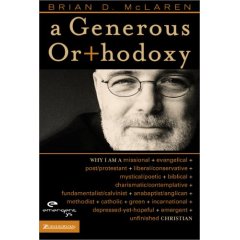 Book Reviews by Sondra Eklund
Book Reviews by Sondra Eklund

|
 |
|
Buy from Amazon.com
Rate this Book Sonderbooks 99 Next Book Nonfiction Christian Previous Book Next Book Fiction Young Adult Fiction Children's Nonfiction Children's Fiction Picture Books 2005 Stand-outs Previous Book Next Book 2004 Stand-outs 2003 Stand-outs 2002 Stand-outs 2001 Stand-outs Five-Star Books PreviousBook Next Book Four-Star Books Old Favorites Back Issues List of Reviews by Title List of Reviews by Author Why Read? Children and Books Links For Book Lovers Book Discussion Forum About Me Contact Me Subscribe Make a Donation I don't review books I don't like! *****= An all-time favorite |

*****A Generous OrthodoxyWhy I am a missional + evangelical + post/protestant + liberal/conservative + mystical/poetic + biblical + charismatic/contemplative + fundamentalist/Calvinist + anabaptist/anglican + Methodist + catholic + green + incarnational + depressed-yet-hopeful + emergent + unfinished CHRISTIANby Brian D. McLaren Reviewed August 27, 2005.
Zondervan, Grand Rapids, Michigan, 2004. 297 pages. Sonderbooks Stand-out 2005 (#1, Christian Nonfiction) Brian D. McLaren is the author of A New Kind of Christian, a book that talked about Christianity in postmodern society, presenting it in a fictional format. I didn’t like the fictional format, but I did like what he had to say. This book presents his ideas about Christianity in a nonfiction format. He strives to present a generous orthodoxy—“Scandalously, the generous orthodoxy you will explore (if you choose to proceed) goes too far, many will say, in the direction of identifying orthodoxy with a consistent practice of humility, charity, courage, and diligence: humility that allows us to admit that our past and current formulations may have been limited or distorted. Charity toward those of other traditions who may understand some things better than our group—even though we are more conscious of what we think we understand better. Courage to be faithful to the true path of our faith as we understand it even when it is unpopular, dangerous, and difficult to do so. Diligence to seek again and again the true path of our faith whenever we feel we have lost our way, which seems to be pretty often.” I like his statement in the introduction: “If I seem to show too little respect for your opinions or thought, be assured I have equal doubts about my own, and I don’t mind if you think I’m wrong. I’m sure I am wrong about many things, although I’m not sure exactly which things I’m wrong about. I’m even sure I’m wrong about what I think I’m right about in at least some cases. So wherever you think I’m wrong, you could be right. If, in the process of determining that I’m wrong, you are stimulated to think more deeply and broadly, I hope that I will have somehow served you anyway.” The bulk of the book explains valuable insight into living the Christian life that the author has gotten from the different traditions mentioned in the subtitle. He is a humble seeker after truth, not too proud to find that truth in another tradition. But he doesn’t just throw every idea into a blender. I like his chapter titled, “Would Jesus Be a Christian?” He also looks at some problem areas in our current traditions and teachings. He says, “Your life could be centered in serving Jesus Christ—which would not replace or eradicate, but rather transform and enrich the way you serve any other legitimate groups or causes. Jesus defined his own identity not as being served, but as giving his life in service, and in this way, acknowledging Jesus as master means one voluntarily ‘takes his yoke’ and learns from Jesus how to serve God, plus one’s neighbor, plus one’s enemy, and so the whole world. Confessing Jesus as Lord means joining his revolution of love and living in this revolutionary way. “How many children in Sunday school learn that radical sense of Christian servant identity as opposed to Christians are nice people who know the truth and do good. Non-Christians are bad people who don’t. Therefore we need to avoid non-Christians or convert them as fast as possible or try to pass laws to keep them under control and protect ourselves from them—until we can escape them forever in heaven?” Another good question he asks is “Can’t seeking my personal salvation as the ultimate end become the ultimate consumerism or narcissism? In a self-centered and hell-centered salvation, doesn’t Jesus—like every company and political party—appeal to me on the basis of self-interest so that I can have it all eternally and can do so cheaply, conveniently, easily, and quickly? Doesn’t this sound a little shabby?” In a chapter about fundamentals of the faith, he says, “Jesus has taught us that the way to know what God is like is not by determining our philosophical boundary conditions/definitions/delineations before departing, but rather the way to know is by embarking on an adventure of faith, hope, and love, even if you don’t know where your path will lead (think of Abraham, Hebrews 11:8). The way to know God is by following Jesus on that adventure. One doesn’t learn what God is like in a library or pew and then begin to love God in real life. One begins to love God and others in real life. In the process one learns what God is like—and one might be driven to the library and pew to learn more. Anyone who doesn’t embark on the adventure of love doesn’t know God at all, whatever he can say or define or delineate, for God is love.” He talks about how the church needs to adjust to the postmodern world: “Our message and methodology have changed, do change, and must change if we are faithful to the ongoing and unchanging mission of Jesus Christ. In other words, I believe that we must be always reforming, not because we’ve got it wrong and we’re closer and closer to finally ‘getting it right,’ but because our mission is ongoing and our context is dynamic. From this viewpoint ‘getting it right’ is beside the point; the point is ‘being and doing good’ as followers of Jesus in our unique time and place, fitting in with the ongoing story of God’s saving love for planet Earth.” In his summing up chapter, he says, “Jesus debated the Pharisees not so that his super-orthodoxy of the exclusively right could finally prevail over theirs, but so that his generous orthodoxy of God’s saving love for all could open wide the doors to God’s house, with a special welcome for the poor, the brokenhearted, the prisoners, the sick, and yes, even the mistaken.” This book presents a challenging, inspirational vision for Christians today. Powerful food for thought. Reviews of other books by Brian D. McLaren: A Generous Orthodoxy Naked Spirituality Why Did Jesus, Moses, the Buddha, and Mohammed Cross the Road? Copyright © 2005 Sondra Eklund. All
rights reserved. |